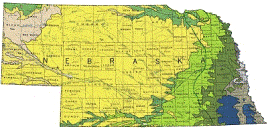United States Geological Survey

United States Geological Survey: Staff Publications
ORCID IDs
Justin T. Martin https://orcid.org/0000-0002-3523-6596
Gregory T. Pederson https://orcid.org/0000-0002-6014-1425
Gregory J. McCabe https://orcid.org/0000-0002-9258-2997
Erika K. Wise https://orcid.org/0000-0002-1712-7476
Marketa McGuire https://orcid.org/0000-0001-8562-3394
Katherine J. Chase https://orcid.org/0000-0002-5796-4148
Jeremy S. Littell https://orcid.org/0000-0002-5302-8280
Stephen T. Gray https://orcid.org/0000-0002-5302-8280
Document Type
Article
Date of this Version
4-26-2020
Citation
PNAS, May 26, 2020, vol. 117, no. 21, pp 11328–11336
doi:10.1073/pnas.1916208117
Abstract
Across the Upper Missouri River Basin, the recent drought of 2000 to 2010, known as the “turn-of-the-century drought,” was likely more severe than any in the instrumental record including the Dust Bowl drought. However, until now, adequate proxy records needed to better understand this event with regard to long-term variability have been lacking. Here we examine 1,200 y of streamflow from a network of 17 new tree-ring–based reconstructions for gages across the upper Missouri basin and an independent reconstruction of warm-season regional temperature in order to place the recent drought in a long-term climate context. We find that temperature has increasingly influenced the severity of drought events by decreasing runoff efficiency in the basin since the late 20th century (1980s) onward. The occurrence of extreme heat, higher evapotranspiration, and associated low-flow conditions across the basin has increased substantially over the 20th and 21st centuries, and recent warming aligns with increasing drought severities that rival or exceed any estimated over the last 12 centuries. Future warming is anticipated to cause increasingly severe droughts by enhancing water deficits that could prove challenging for water management.
Includes supplemental file
Included in
Geology Commons, Oceanography and Atmospheric Sciences and Meteorology Commons, Other Earth Sciences Commons, Other Environmental Sciences Commons


Comments
U.S. government work